牛津深圳版七年级上册Module 1 My life Unit 2 Daily life-More practice课件(共31张PPT)
文档属性
| 名称 | 牛津深圳版七年级上册Module 1 My life Unit 2 Daily life-More practice课件(共31张PPT) | 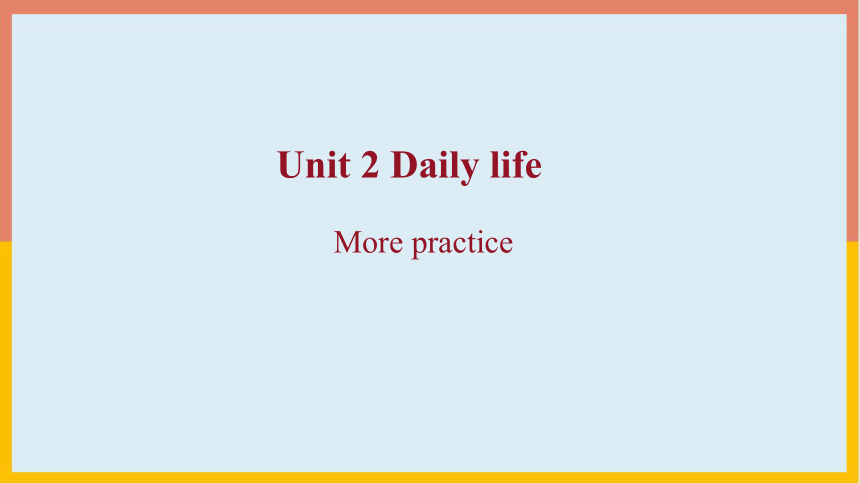 | |
| 格式 | pptx | ||
| 文件大小 | 4.8MB | ||
| 资源类型 | 教案 | ||
| 版本资源 | 牛津深圳版 | ||
| 科目 | 英语 | ||
| 更新时间 | 2022-11-18 20:13:32 | ||
图片预览

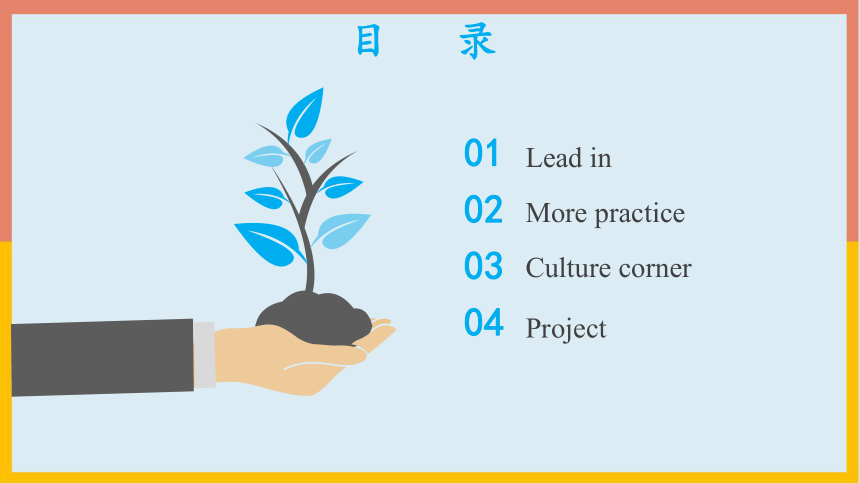

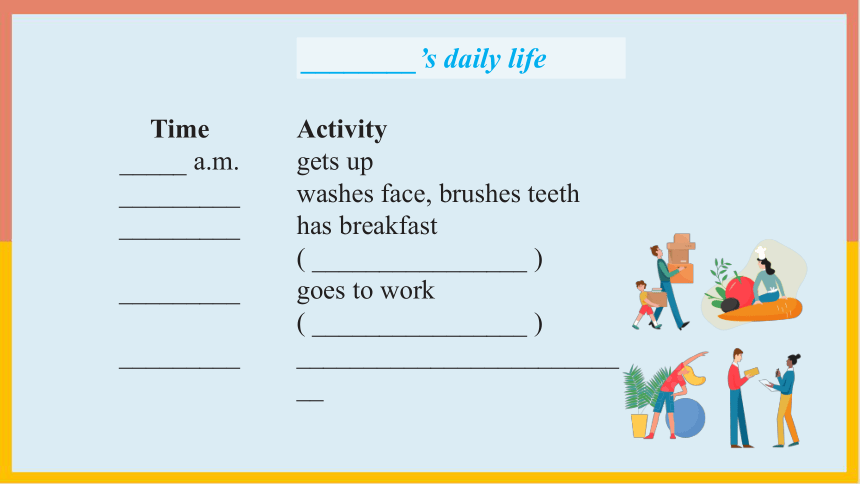

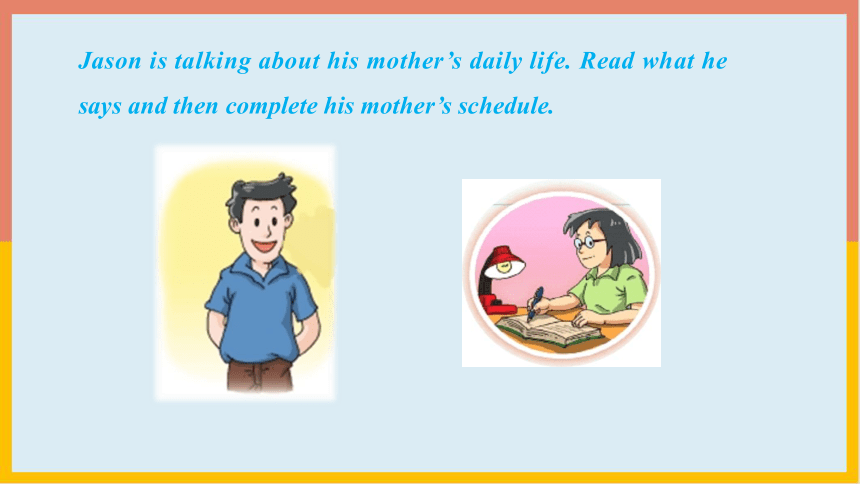
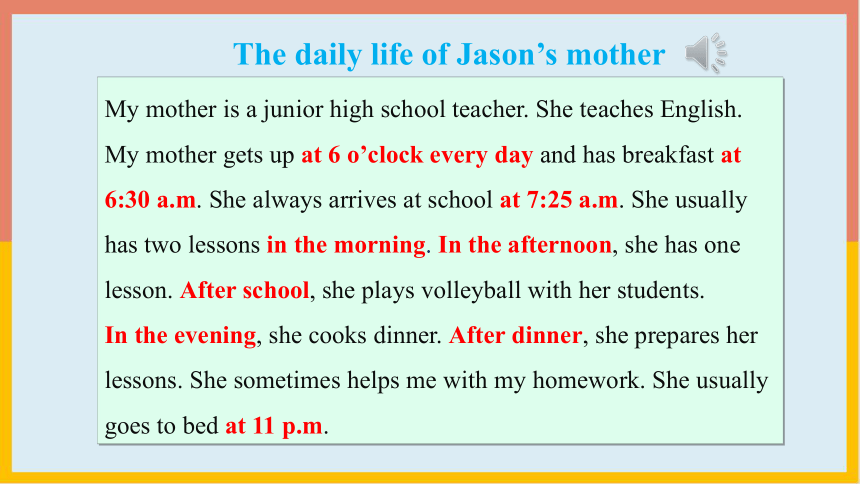
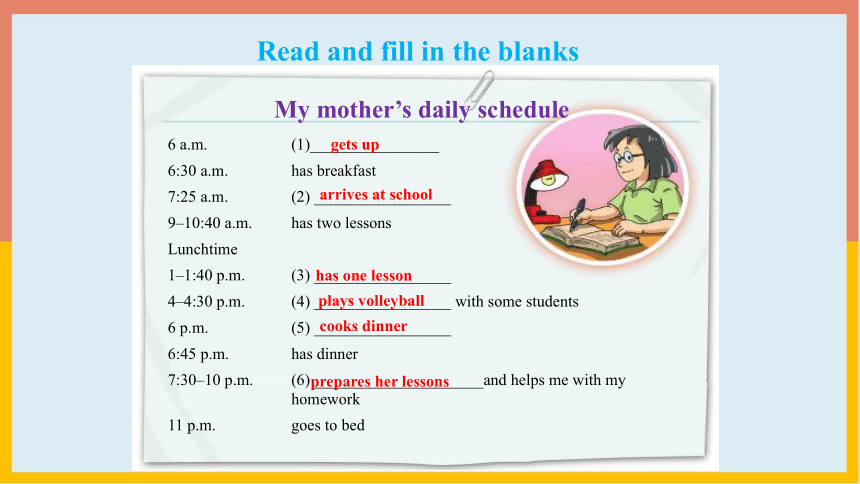
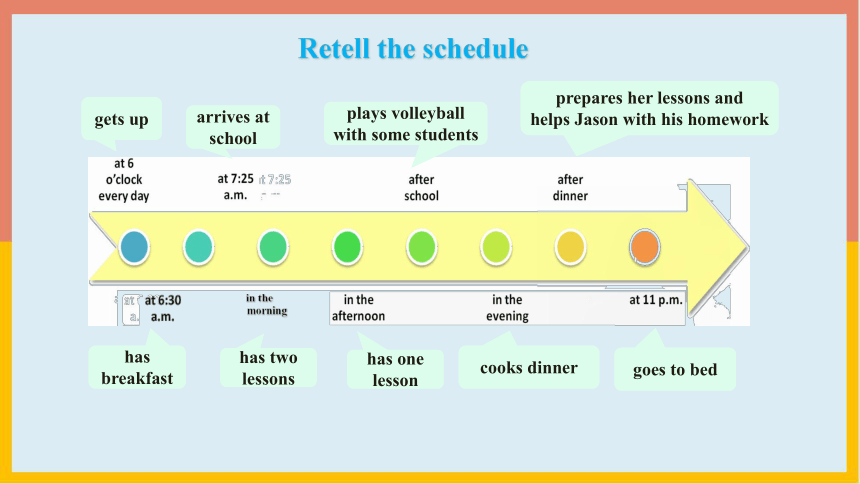
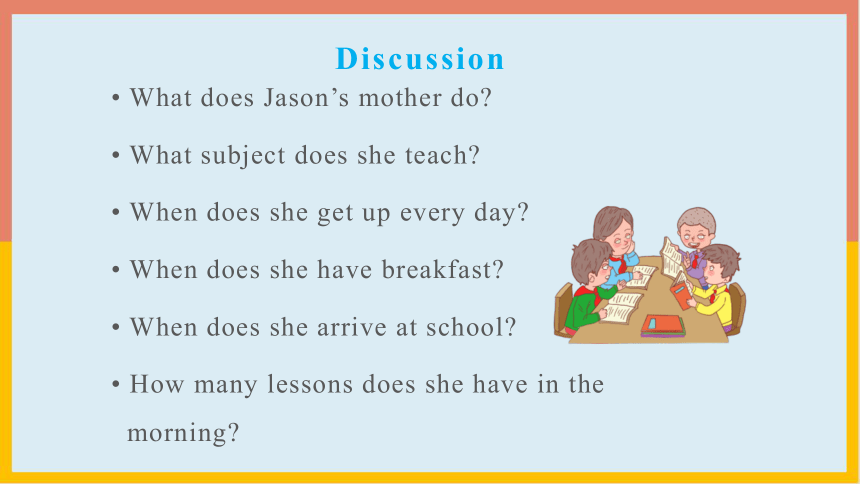
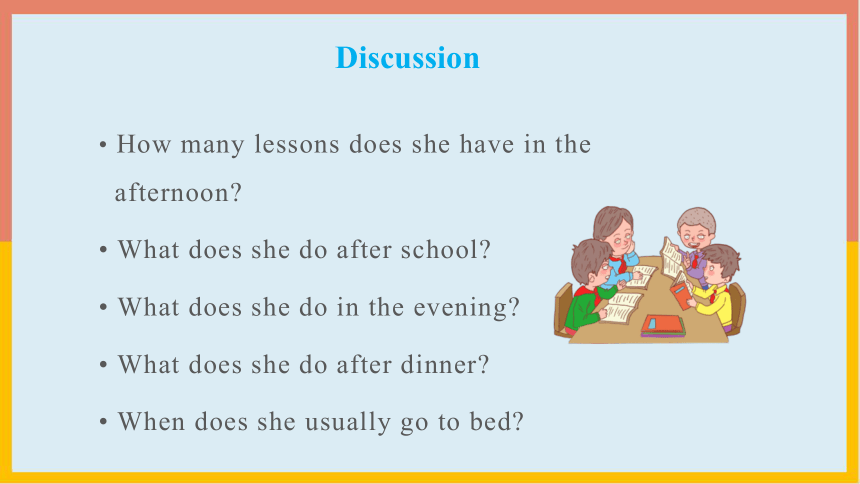
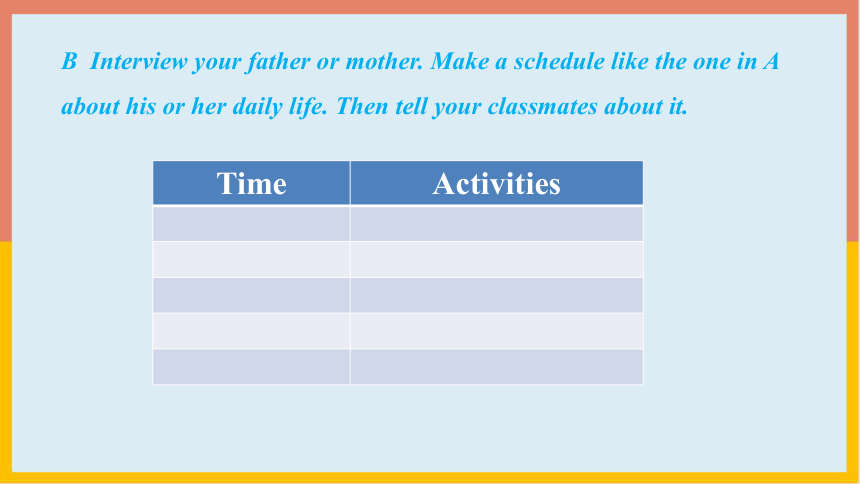
文档简介
(共31张PPT)
More practice
Unit 2 Daily life
01
02
03
04
Lead in
More practice
Culture corner
Project
目 录
Lead in
Time
_____ a.m.
_________
_________
_________
_________
Activity
gets up
washes face, brushes teeth
has breakfast
( ________________ )
goes to work
( ________________ )
__________________________
________’s daily life
More practice
Jason is talking about his mother’s daily life. Read what he says and then complete his mother’s schedule.
The daily life of Jason’s mother
My mother is a junior high school teacher. She teaches English.
My mother gets up at 6 o’clock every day and has breakfast at 6:30 a.m. She always arrives at school at 7:25 a.m. She usually has two lessons in the morning. In the afternoon, she has one lesson. After school, she plays volleyball with her students.
In the evening, she cooks dinner. After dinner, she prepares her lessons. She sometimes helps me with my homework. She usually goes to bed at 11 p.m.
My mother’s daily schedule 6 a.m. (1)________________
6:30 a.m. has breakfast
7:25 a.m. (2) _________________
9–10:40 a.m. has two lessons
Lunchtime
1–1:40 p.m. (3) _________________
4–4:30 p.m. (4) _________________ with some students
6 p.m. (5) _________________
6:45 p.m. has dinner
7:30–10 p.m. (6) _____________________and helps me with my homework
11 p.m. goes to bed
gets up
arrives at school
has one lesson
plays volleyball
cooks dinner
prepares her lessons
Read and fill in the blanks
Retell the schedule
gets up
arrives at school
goes to bed
plays volleyball with some students
prepares her lessons and
helps Jason with his homework
has breakfast
has one lesson
cooks dinner
in the
morning
has two lessons
Discussion
What does Jason’s mother do
What subject does she teach
When does she get up every day
When does she have breakfast
When does she arrive at school
How many lessons does she have in the morning
How many lessons does she have in the afternoon
What does she do after school
What does she do in the evening
What does she do after dinner
When does she usually go to bed
Discussion
B Interview your father or mother. Make a schedule like the one in A about his or her daily life. Then tell your classmates about it.
Time Activities
Let’s learn the new words and expressions.
She always arrives at school at 7:25 a.m.
她总是在早上7点25分到学校。
arrive 意为“到达”,相当于get to。两者的用法如下:
(1) arrive 后跟地点名词时,应接介词 in 或 at,意为“到达某地”。一般表示到达城市或国家等大的范围时用介词 in;表示到达某个具体地点时用介词 at。其可以与 get to 互换使用。
Notes (More practice)
e.g.
我爸爸昨天到了上海。
My father arrived in / got to Shanghai yesterday.
两天后他们会到达那个村庄。
They will arrive at / get to the village in two days.
Notes (More practice)
(2) 如果之后跟地点副词(如:here,there home 等),arrive 和get 都不需要再接介词。如:
arrive / get here 到达这里
arrive / get there 到达那里
arrive / get home 到家
Notes (More practice)
(3) 仅表示“到达”,而没有特指“到达某地”时,用 arrive 而不用 get to,且 arrive 之后不需要接介词。
e.g. 他昨天到的。
He arrived yesterday.
Notes (More practice)
选择最佳答案填空。
( )1. When does your brother usually ____ home after school
A. get B. get to C. arrive in D. arrive at
根据中文意思完成句子。
2. 明天早上8点钟你们一定要到公园门口。
You must _______ ______ the gate of the park at 8 a.m. tomorrow morning.
3. 这些孩子什么时候到这里的?这儿很危险。
When did these children ______ ______ It’s dangerous.
arrive/get here
A
arrive at/ get to
选择最佳答案填空。
( )1. ____ the boy ____ TV on weekdays
A. Do, watches B. Does, watch C. Do, watch D. Does, watches
( )2. My grandma ____ to the park every two days.
A. go B. goes C. going D. is going
( )3. Mary always ____ breakfast at 6:30 a.m. in the morning.
A. have B. to have C. having D. has
D
B
B
( )4. When the bell ____, all the students go out of the classroom quickly.
A. ringing B. is ring C. rings D. ring
( )5. My mother likes dancing. She goes dancing in the square ____.
A. twice a week B. twice week
C. one time week D. once week
( )6. Mr Green and Mrs Green ____ to work at 7:40 a.m. and ____home at 6:30 p.m.
A. go, come B. goes, come C. go, comes D. goes, comes
C
A
A
根据中文意思完成句子。
1. 明天早上8点钟你们一定要到公园门口。
You must _____ _____ the gate of the park at 8:00 tomorrow morning.
3. 你什么时候能到这里啊?
When can you _________ _________
4. 莫妮卡经常帮妈妈做家务。
Monica often _____ her mum _________ the housework.
5. 李老师在一所初级中学教数学。
Mr Li teaches Maths _____ _____ _____ _____.
arrive at/get to
helps do / with
a junior high school
get/arrive here
6. 10点钟了,该去睡觉了。
It’s 10:00 p.m. It’s time to _____ _____ _____ .
7. 他们通常在早上7点半到达学校。
They usually _____ _____ school at 7:30 a.m.
8. 这个学期张老师教我们英语。
Miss Zhang ______ _______ _______ this term.
9. 我喜欢和我妈妈打排球。
I like _______ _______ _______ my mum.
teaches us English
go to bed
arrive/get at
playing volleyball with
Culture corner
Culture corner
Who likes to keep a diary
Who likes to keep a diary in English
What do you write about
Many people around the world keep a diary. They write in it every day.In a diary, you can write about your daily life.
People often start by writing “Dear Diary”. They think of the diary as a friend.
Self-assessment
Project
About the project
Our new classmates
Do you want to know more about your new classmates In this project, you will help make a book called Our new classmates.
Use Wh- questions to ask people about their daily life.
How
Make questions
A Prepare a list of questions. Here is an example.
Our new classmate: _________
1 Where _____________
I live at 8 Park Road.
2 How many people are there in
your family
There are three—my parents and
me.
3 What ______________________
_____________________
My father is a teacher at a junior
high school. My mother is a nurse.
4 How _______________________
I usually go to school by bus.
5 What _______________________
My favourite subject is Maths.
6 What _______________________
My favourite sport is basketball.
I play it once a week, on Sundays.
7 When ______________________
I often go to bed at 10 p.m.
do you live
do you go to school
is your favourite subject
is your favourite sport
do you go to bed
are your parents’ jobs/do
your parents do
You can also think of more questions!
What is your favourite food/ colour/ singer/ film
What are your hobbies
What do you usually do at the weekend
When do you usually go to bed
Do you keep a pet What is it
Have you decided all your questions
Have an interview
B In pairs, ask your classmate questions and make notes of the answers. If possible, take a photo of your classmate.
Tip:
Write down the key information. It does not have to be full sentences. Words, phrases or even pictures can be helpful.
More practice
Unit 2 Daily life
01
02
03
04
Lead in
More practice
Culture corner
Project
目 录
Lead in
Time
_____ a.m.
_________
_________
_________
_________
Activity
gets up
washes face, brushes teeth
has breakfast
( ________________ )
goes to work
( ________________ )
__________________________
________’s daily life
More practice
Jason is talking about his mother’s daily life. Read what he says and then complete his mother’s schedule.
The daily life of Jason’s mother
My mother is a junior high school teacher. She teaches English.
My mother gets up at 6 o’clock every day and has breakfast at 6:30 a.m. She always arrives at school at 7:25 a.m. She usually has two lessons in the morning. In the afternoon, she has one lesson. After school, she plays volleyball with her students.
In the evening, she cooks dinner. After dinner, she prepares her lessons. She sometimes helps me with my homework. She usually goes to bed at 11 p.m.
My mother’s daily schedule 6 a.m. (1)________________
6:30 a.m. has breakfast
7:25 a.m. (2) _________________
9–10:40 a.m. has two lessons
Lunchtime
1–1:40 p.m. (3) _________________
4–4:30 p.m. (4) _________________ with some students
6 p.m. (5) _________________
6:45 p.m. has dinner
7:30–10 p.m. (6) _____________________and helps me with my homework
11 p.m. goes to bed
gets up
arrives at school
has one lesson
plays volleyball
cooks dinner
prepares her lessons
Read and fill in the blanks
Retell the schedule
gets up
arrives at school
goes to bed
plays volleyball with some students
prepares her lessons and
helps Jason with his homework
has breakfast
has one lesson
cooks dinner
in the
morning
has two lessons
Discussion
What does Jason’s mother do
What subject does she teach
When does she get up every day
When does she have breakfast
When does she arrive at school
How many lessons does she have in the morning
How many lessons does she have in the afternoon
What does she do after school
What does she do in the evening
What does she do after dinner
When does she usually go to bed
Discussion
B Interview your father or mother. Make a schedule like the one in A about his or her daily life. Then tell your classmates about it.
Time Activities
Let’s learn the new words and expressions.
She always arrives at school at 7:25 a.m.
她总是在早上7点25分到学校。
arrive 意为“到达”,相当于get to。两者的用法如下:
(1) arrive 后跟地点名词时,应接介词 in 或 at,意为“到达某地”。一般表示到达城市或国家等大的范围时用介词 in;表示到达某个具体地点时用介词 at。其可以与 get to 互换使用。
Notes (More practice)
e.g.
我爸爸昨天到了上海。
My father arrived in / got to Shanghai yesterday.
两天后他们会到达那个村庄。
They will arrive at / get to the village in two days.
Notes (More practice)
(2) 如果之后跟地点副词(如:here,there home 等),arrive 和get 都不需要再接介词。如:
arrive / get here 到达这里
arrive / get there 到达那里
arrive / get home 到家
Notes (More practice)
(3) 仅表示“到达”,而没有特指“到达某地”时,用 arrive 而不用 get to,且 arrive 之后不需要接介词。
e.g. 他昨天到的。
He arrived yesterday.
Notes (More practice)
选择最佳答案填空。
( )1. When does your brother usually ____ home after school
A. get B. get to C. arrive in D. arrive at
根据中文意思完成句子。
2. 明天早上8点钟你们一定要到公园门口。
You must _______ ______ the gate of the park at 8 a.m. tomorrow morning.
3. 这些孩子什么时候到这里的?这儿很危险。
When did these children ______ ______ It’s dangerous.
arrive/get here
A
arrive at/ get to
选择最佳答案填空。
( )1. ____ the boy ____ TV on weekdays
A. Do, watches B. Does, watch C. Do, watch D. Does, watches
( )2. My grandma ____ to the park every two days.
A. go B. goes C. going D. is going
( )3. Mary always ____ breakfast at 6:30 a.m. in the morning.
A. have B. to have C. having D. has
D
B
B
( )4. When the bell ____, all the students go out of the classroom quickly.
A. ringing B. is ring C. rings D. ring
( )5. My mother likes dancing. She goes dancing in the square ____.
A. twice a week B. twice week
C. one time week D. once week
( )6. Mr Green and Mrs Green ____ to work at 7:40 a.m. and ____home at 6:30 p.m.
A. go, come B. goes, come C. go, comes D. goes, comes
C
A
A
根据中文意思完成句子。
1. 明天早上8点钟你们一定要到公园门口。
You must _____ _____ the gate of the park at 8:00 tomorrow morning.
3. 你什么时候能到这里啊?
When can you _________ _________
4. 莫妮卡经常帮妈妈做家务。
Monica often _____ her mum _________ the housework.
5. 李老师在一所初级中学教数学。
Mr Li teaches Maths _____ _____ _____ _____.
arrive at/get to
helps do / with
a junior high school
get/arrive here
6. 10点钟了,该去睡觉了。
It’s 10:00 p.m. It’s time to _____ _____ _____ .
7. 他们通常在早上7点半到达学校。
They usually _____ _____ school at 7:30 a.m.
8. 这个学期张老师教我们英语。
Miss Zhang ______ _______ _______ this term.
9. 我喜欢和我妈妈打排球。
I like _______ _______ _______ my mum.
teaches us English
go to bed
arrive/get at
playing volleyball with
Culture corner
Culture corner
Who likes to keep a diary
Who likes to keep a diary in English
What do you write about
Many people around the world keep a diary. They write in it every day.In a diary, you can write about your daily life.
People often start by writing “Dear Diary”. They think of the diary as a friend.
Self-assessment
Project
About the project
Our new classmates
Do you want to know more about your new classmates In this project, you will help make a book called Our new classmates.
Use Wh- questions to ask people about their daily life.
How
Make questions
A Prepare a list of questions. Here is an example.
Our new classmate: _________
1 Where _____________
I live at 8 Park Road.
2 How many people are there in
your family
There are three—my parents and
me.
3 What ______________________
_____________________
My father is a teacher at a junior
high school. My mother is a nurse.
4 How _______________________
I usually go to school by bus.
5 What _______________________
My favourite subject is Maths.
6 What _______________________
My favourite sport is basketball.
I play it once a week, on Sundays.
7 When ______________________
I often go to bed at 10 p.m.
do you live
do you go to school
is your favourite subject
is your favourite sport
do you go to bed
are your parents’ jobs/do
your parents do
You can also think of more questions!
What is your favourite food/ colour/ singer/ film
What are your hobbies
What do you usually do at the weekend
When do you usually go to bed
Do you keep a pet What is it
Have you decided all your questions
Have an interview
B In pairs, ask your classmate questions and make notes of the answers. If possible, take a photo of your classmate.
Tip:
Write down the key information. It does not have to be full sentences. Words, phrases or even pictures can be helpful.
